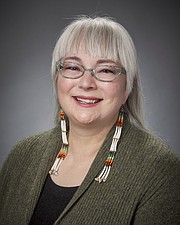MSU instructor to create contemporary Indigenous art website
BOZEMAN – A Montana State University art history and Native American studies instructor and the Little Shell Tribe of Chippewa Indians of Montana have received a $50,000 grant from the National Endowment of the Humanities to create a multimedia website showcasing contemporary Native American art of the region.
Jennifer Woodcock-Medicine Horse received the NEH’s Association of Tribal Archives Libraries and Museums American Rescue Plan grant to fund the project, "IndigenEyes: Contemporary Native American Art of the Rocky Mountain West." The project is in collaboration with the Little Shell tribe, which is represented by tribal councilwoman Kimberly McKeehan. The grant funds a website showcasing 18 Native American artists of the region. Woodcock-Medicine Horse teaching courses in both the School of Art in the College of Arts and Architecture and the Department of Native American Studies in the College of Letters and Science.
“The funding, from NEH COVID relief funding, will create an opportunity for remote communities to be exposed to the amazing abundance of excellent Native artists in our region,” Woodcock-Medicine Horse said. She said the website, which will include short videos created by the MSU School of Film and Photography, will go live in January.
Woodcock-Medicine Horse said in addition to video interviews with artists, the project digitized art from regional artists, curriculum and virtual class tours with a curator, among other highlights. She said the project will begin with 18 contemporary artists, with plans to add more in the future.
Regina Gee, professor of art history and Leadership Fellow for the School of Art, said the project will expand offerings in the School of Art’s art history programs.
“It is particularly exciting, in my opinion, that she is envisioning not simply an exhibit for our students and the larger community but an ongoing ‘knowledge hub’ capable of being sensitive and responsive to new artists and changing social issues,” Gee said.
Woodcock-Medicine Horse said the idea for the project came from two sources: the online exhibits created by the National Museum of the American Indian and from her research preparing lectures for her contemporary Native American art history course at MSU. Frequently she would encounter a single page on museum websites describing an extraordinary past exhibition, without any accompanying imagery or curatorial remarks.
“This web portal will allow for a permanent digital showcase of regional Native artists,” she said.
Artists from all Montana tribes will be represented including the Blackfeet, the Chippewa-Cree, the Confederated Salish and Kootenai and Pend d’Oreille Tribes, the Assiniboine, Gros Ventre, Assiniboine and Sioux, Northern Cheyenne, Crow and the Little Shell Chippewa. Artists from tribes from outside Montana will also be eligible, she said.
Woodcock-Medicine Horse holds a doctorate in American Studies/Museum Studies and master’s degree in Native American Studies from MSU, as well as a bachelor’s degree in anthropology and archaeology from the University of California, Berkeley. Her primary research focus is on contemporary Native American art. In 2021 she curated “ReCouping Sovereignty,” an exhibit for the Bozeman Art Museum. She is working with Tinworks Art to present two events in Bozeman in July – a mural installation by Louis Still Smoking, and a Native fashion show by Gina Still Smoking.
McKeehan earned degrees in English literature, Native American studies and social work from Montana universities and now lives in Great Falls working as a counselor at the local community health clinic working to heal intergenerational trauma through community and cultural interventions. She serves as a health liaison for the Little Shell tribe and is a member of the Montana Native American Suicide Task Force, American Indian Health Leaders, the American Indigenous Research Association and the Indigenous Research Initiative
According to the NEH’s website, its SHARP grants, which were made to entities in all 50 states, provide emergency relief to help offset financial losses sustained by humanities organizations to help them recover from the economic impact of the pandemic.



